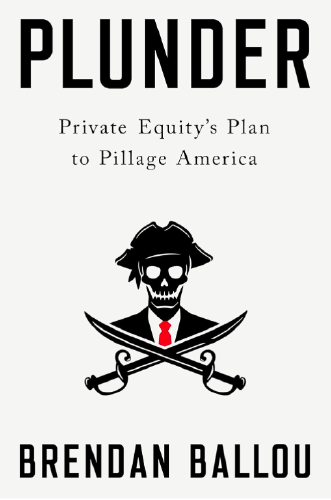
Plunder: Private Equity's Plan to Pillage America
A clear-eyed exposé of how private equity firms extract wealth from American companies, workers, and communities, and a roadmap for reforming the system.
Review:
Brendan Ballou’s “Plunder” is a searing indictment of the private equity (PE) industry and its outsized, often destructive influence on the American economy. Drawing on his experience as a federal prosecutor and extensive research, Ballou reveals how private equity firms—often operating behind the scenes—acquire companies, load them with debt, extract value for themselves, and leave workers, consumers, and communities to pick up the pieces.
Private equity is not just a part of the American economy. Increasingly, Ballou argues, “it is the American economy.” PE firms collectively control more than $7 trillion in assets and own companies that employ over 11 million Americans—about one in every 13 U.S. workers. At one point, private equity owned companies employing one in every eight U.S. retail workers. Their reach extends into nearly every sector: hospitals, nursing homes, newspapers, retail chains, and even prisons.
The typical PE playbook is simple: buy companies with borrowed money, slash costs (often through layoffs and reduced services), extract millions in management fees, transaction fees, and dividends—sometimes more than the company’s annual profits—and then sell or bankrupt the company. Ballou details how this model prioritizes short-term profit over long-term stability or public good. “The private equity business model is simple: buy companies, load them with debt, extract as much value as possible, and then sell or bankrupt them.”
The consequences are staggering. After private equity takeovers, mortality rates in nursing homes increased by 10%, according to a study cited by Ballou. Since 2012, PE-owned companies have accounted for nearly two-thirds of all retail bankruptcies. Over 1,300 U.S. communities have lost local news coverage in the last 15 years, with private equity ownership accelerating newsroom layoffs and closures. In healthcare, PE ownership has led to higher costs and worse outcomes for patients, such as the spread of surprise medical billing after PE firms acquired physician staffing companies. In the prison sector, PE firms have profited from mass incarceration and immigration detention.
Ballou shows how PE’s tactics lead to job losses, lower wages, higher prices, and reduced quality of essential services. “When private equity comes to town, jobs are lost, wages are cut, and communities are left to pick up the pieces.” The book also exposes how PE firms use complex legal structures to avoid liability, skirt regulations, and shield themselves from lawsuits, making it difficult for workers, consumers, or the government to hold them accountable. The “carried interest” loophole allows private equity managers to pay lower tax rates on their earnings than many ordinary workers.
Ballou is blunt about the political influence of private equity: “Private equity’s influence is everywhere, but its accountability is nowhere.” PE firms spend millions on lobbying and campaign contributions to protect their interests and block reform. “We need to stop treating private equity as just another form of investment and start treating it as a political and social force that needs to be regulated.”
But “Plunder” is not just a diagnosis—it’s a roadmap for change. Ballou calls for closing legal loopholes, increasing transparency, holding PE firms liable for the harms they cause, and empowering workers and communities. His proposals are practical and actionable, aimed at rebalancing power in the economy.
“Plunder” is praised for its clarity, use of vivid examples, and ability to make complex financial structures understandable. Ballou’s tone is urgent but hopeful, insisting that change is possible if citizens and policymakers act. The book has been called the most clear-eyed roadmap for change in recent years—a must-read for anyone concerned about corporate power and economic justice.
Most clear-eyed roadmap for change I’ve read in a long time. Mr. Ballou, run for president please.
Private equity is one of those subjects that feels both immensely important and deliberately opaque. Brendan Ballou’s Plunder rips back the curtain. This book is a devastating, meticulously researched indictment of the private equity industry and its corrosive effect on American life.